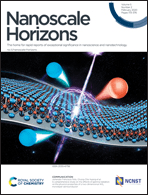
Nanoscale Horizons
metrics 2024
Transforming Ideas into Nanoscale Applications
Introduction
Nanoscale Horizons is an esteemed journal published by the Royal Society of Chemistry, focusing on cutting-edge research in the field of nanoscale materials and their applications. Established in 2016, this journal quickly gained prominence, achieving a Q1 ranking in Materials Science (miscellaneous) and a notable rank of #32 out of 463 in the Scopus index, placing it in the 93rd percentile among its peers. With its rigorous peer-review process and commitment to disseminating high-impact research, Nanoscale Horizons serves as a vital platform for sharing innovative discoveries and interdisciplinary advancements. Researchers and professionals are invited to explore the exciting developments in nanotechnology through this publication, fostering collaboration and knowledge exchange in an ever-evolving field. Though currently not open access, the journal ensures that significant research findings are made available to a diverse audience keen on advancing materials science.
Metrics 2024
 2.09
2.09 8.00
8.00 8.80
8.80 74
74Metrics History
Rank 2024
Scopus
IF (Web Of Science)
JCI (Web Of Science)
Quartile History
Similar Journals
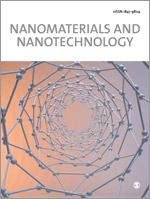
Nanomaterials and Nanotechnology
Exploring the Frontiers of NanotechnologyNanomaterials and Nanotechnology is a premier journal published by HINDAWI LTD, dedicated to advancing knowledge in the rapidly evolving fields of nanomaterials and nanoscale applications. Established as an Open Access platform since 2011, the journal aims to disseminate high-quality research that provides insights into nanotechnology's manifold aspects, including biotechnology, ceramics and composites, as well as electrical and electronic engineering. With a compelling impact factor reflected in its robust Scopus rankings—placing it in the 80th percentile in Engineering and the 72nd percentile in Biotechnology—it stands as a key resource for researchers, professionals, and students seeking to stay at the forefront of innovation in materials science. The journal occupies a distinguished position in the academic community, featuring studies that explore the synthesis, characterization, and application of nanomaterials, thereby contributing significantly to scientific discourse and technological advancement in this critical area.
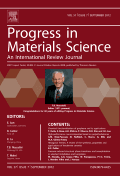
PROGRESS IN MATERIALS SCIENCE
Exploring the Frontiers of Material InnovationPROGRESS IN MATERIALS SCIENCE is an esteemed peer-reviewed journal published by Pergamon-Elsevier Science Ltd, focusing on pioneering advancements and comprehensive studies in the field of Materials Science. With an ISSN of 0079-6425 and an E-ISSN of 1873-2208, this journal boasts a prestigious status, ranking in the Q1 category for Materials Science (miscellaneous) and achieving a remarkable 99th percentile in Scopus rankings, positioned 4th out of 463 journals in General Materials Science. Published from the United Kingdom, PROGRESS IN MATERIALS SCIENCE provides critical insights into the latest discoveries, trends, and methodologies shaping the materials science landscape, making it an invaluable resource for researchers, professionals, and students alike. Readers can explore rich content on subjects ranging from nanomaterials to biomaterials and beyond, all designed to foster innovation and knowledge dissemination in the materials science community. Although it is not an open-access journal, it remains a pivotal platform for high-quality research and essential discourse in this dynamic field.
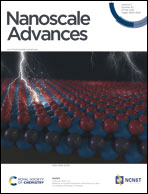
Nanoscale Advances
Connecting Research and Innovation at the Nanoscale.Nanoscale Advances, published by the Royal Society of Chemistry, stands out as a leading open-access journal dedicated to advancing the field of nanoscience and nanotechnology since its inception in 2018. With a specialized focus on areas such as atomic and molecular physics, bioengineering, chemistry, and materials science, this journal has consistently achieved top-tier rankings across several categories, reflecting its high-impact contribution to research and innovation. Currently classified in the Q1 quartile for both Atomic and Molecular Physics and Chemistry (Miscellaneous), and Q2 for Bioengineering, its prestige is underscored by impressive Scopus rankings, including a notable 34th position in General Engineering. With its commitment to disseminating high-quality research, Nanoscale Advances serves as an invaluable resource for researchers, professionals, and students alike, fostering collaboration and scholarly exchange in the rapidly evolving landscape of nanotechnology.
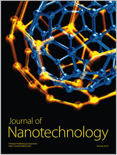
Journal of Nanotechnology
Unveiling the Potential of NanotechnologyThe Journal of Nanotechnology, published by Hindawi Ltd., is a premier open-access platform dedicated to delivering high-quality research in the dynamic field of nanotechnology. With the ISSN 1687-9503 and E-ISSN 1687-9511, this journal has been at the forefront of disseminating innovative findings since its transition to open access in 2009, fostering a global dialogue among researchers, professionals, and students. Based in Egypt, the journal maintains its commitment to advancing the material science sector, currently holding a prestigious Q2 ranking in the 2023 Materials Science (miscellaneous) category, reflecting its significant contribution to the field. With a Scopus ranking of #162 out of 463 journals in General Materials Science, placing it in the 65th percentile, the Journal of Nanotechnology serves as a crucial resource for those looking to explore the latest advancements and applications in nanomaterials. The journal invites submissions that align with its scope, which emphasizes interdisciplinary approaches and novel methodologies, promising to enhance both academic and practical aspects of nanotechnology.

Journal of Ovonic Research
Fostering Interdisciplinary Insights in Ovonic Research.Journal of Ovonic Research is a distinguished publication dedicated to advancing the fields of electronic, optical, and magnetic materials. Published by VIRTUAL CO PHYSICS SRL, this journal offers a platform for researchers to share innovative findings and developments that push the boundaries of technology and materials science. With an ISSN of 1842-2403 and an E-ISSN of 1584-9953, it provides an important service to the academic community, particularly within Romania and beyond. Despite its recent inception in 2011, the journal has gained traction in the academic landscape, reflecting a Q4 quartile ranking in crucial categories such as Electronic, Optical and Magnetic Materials, as well as in Physics and Astronomy. The Scopus rankings further underscore its positioning, ranking within the 25th to 37th percentile across various disciplines, making it a valuable resource for professionals and students alike. Although the journal currently operates on a non-open access basis, it remains committed to exploring the latest advancements in materials science, encouraging interdisciplinary collaboration and fostering a deeper understanding of surface, coating, and film technologies. As the field evolves, Journal of Ovonic Research stands as a beacon for scholarly communication, bridging the gap between research and practical application.

JOURNAL OF CLUSTER SCIENCE
Exploring the Frontiers of Cluster ScienceJOURNAL OF CLUSTER SCIENCE, published by SPRINGER/PLENUM PUBLISHERS, is a prominent and influential journal in the fields of Biochemistry, Chemistry, Condensed Matter Physics, and Materials Science. With an ISSN of 1040-7278 and E-ISSN of 1572-8862, this journal has been contributing to scientific discourse since its inception in 1990 and continues to publish cutting-edge research through 2024. It holds a respectable position in the academic landscape with its category quartiles indicating a Q3 ranking in Biochemistry and Q2 rankings in Chemistry, Condensed Matter Physics, and Materials Science as of 2023. The journal's noteworthy Scopus rankings further underscore its relevance, particularly a rank of #82 in Condensed Matter Physics, showcasing its impact and the quality of research disseminated. Although it does not currently offer open access options, it remains a key resource for researchers, professionals, and students who are invested in understanding the complexities of cluster science and its interdisciplinary applications.

ChemNanoMat
Fostering Collaboration in Cutting-Edge ResearchChemNanoMat is a prestigious academic journal published by WILEY-V C H VERLAG GMBH, dedicated to the rapidly evolving fields of nanoscale materials and their applications in diverse areas such as biomaterials, energy engineering, and environmental sustainability. With the journal's ISSN 2199-692X and recognized quality, as evidenced by its Q2 rankings across multiple categories—including Biomaterials and Renewable Energy—ChemNanoMat serves as a crucial platform for researchers, professionals, and students to disseminate their findings and foster collaborations. Operating from Germany, the journal encourages the exploration of innovative materials solutions to meet tomorrow's challenges. While it does not currently offer open access options, it remains highly regarded in the academic community with a competitive impact factor that emphasizes its relevance and influence in guiding future research directions. Covering a broad scope from 2015 through 2024, ChemNanoMat is key for anyone invested in the advancement of materials chemistry and related scientific fields.

Plasmonics
Pioneering Research in Surface Plasmon ApplicationsPlasmonics, published by Springer, is a prestigious journal dedicated to advancing the field of plasmonics and its interdisciplinary applications, with a particular focus on biochemistry, biophysics, biotechnology, and nanoscience. Established in 2006, this peer-reviewed journal serves as a vital platform for researchers to disseminate groundbreaking findings and innovative methodologies related to the manipulation and application of surface plasmons for various technologies. Featuring an impressive Q3 ranking in critical scientific categories, including Biochemistry and Nanotechnology, Plasmonics is recognized for its contribution to enhancing the understanding of nanoscale phenomena and their relevance to contemporary research and development. While currently not an open-access publication, Plasmonics continues to play a key role in bridging academic inquiry and practical application, making it indispensable for professionals and students striving to stay at the forefront of this dynamic field.

Journal of Nanoanalysis
Unveiling the Potential of Nanomaterials CharacterizationThe Journal of Nanoanalysis is a leading publication in the field of nanotechnology, dedicated to advancing the understanding and application of nanoscale analysis methodologies. Published by BORNA SANJESH KIMIA CO-BSK CO, this journal aims to provide a comprehensive platform for researchers, professionals, and students to disseminate cutting-edge findings and innovative approaches in nanomaterials characterization, nanoelectronics, and related areas. With a focus on high-quality peer-reviewed articles, the journal supports the global scientific community in fostering interdisciplinary collaboration and knowledge sharing. Although currently lacking an explicit impact factor, the Journal of Nanoanalysis is poised to make significant contributions to the field, with its commitment to open access and accessibility globally enriching the pool of research available for academic and practical advancements.

Journal of Nano Research
Advancing the Frontiers of NanotechnologyThe Journal of Nano Research, published by Trans Tech Publications Ltd, is a distinguished academic journal dedicated to the rapidly evolving field of nanotechnology and materials science. With an ISSN of 1662-5250 and an E-ISSN of 1661-9897, the journal has been an important platform for researchers and professionals since its inception in 2008, continuing to provide high-quality peer-reviewed research through to 2024. Nestled in Switzerland, the Journal of Nano Research plays a pivotal role in disseminating cutting-edge findings, as recognized by its categorization in Q3 for Materials Science and Physics while being positioned in Q4 for Nanoscience and Nanotechnology as of 2023. With Scopus rankings highlighting its impact, including Rank #129 in general Physics and Astronomy and Rank #300 in Materials Science, this journal is crucial for academics seeking to stay ahead in research trends and innovations in nano-related disciplines. Although it operates under a subscription model, the journal's objectives include fostering collaboration and knowledge-sharing among researchers, making it an invaluable resource for anyone immersed in the world of nanotechnology.